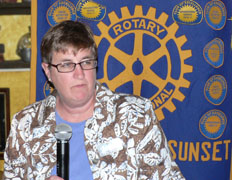PV Library District, by Kathy Gould, Director

Kathy was born in Santa Barbara but grew up in Manitoba, Canada. She returned to California for a Master of Science in Library and Information Management from USC. Then she worked at the Pasadena Public Library and in the corporate library of a small technology company. She spent 15 years in management in mining and manufacturing companies in New Zealand, Australia and Kentucky.
Kathy returned to California and has been Director of the Palos Verdes Library District since 2004. She is responsible for operating all 3 libraries, including financial management, fundraising, facilities and technology management, and supervising 85 employees and 200 volunteers. She has been involved in many other community organizations including the Chamber of Commerce and visitors Bureau, Volunteer Center of the South Bay, California Library Association and other statewide California library activities.
Kathy showed a pictorial history of writing and library development starting with the cuneiform writing on clay tablets thousands of years ago in Mesopotamia. She showed illustrations of the famous Alexandria Library in Egypt, the library in Ephesus in Asia Minor (where the apostle Paul preached), the Gutenberg Bible, and the Library of Congress in Washington. Literacy was accompanied by other developments in political systems, the Industrial Revolution and public education. Benjamin Franklin, who came from humble roots, was a highly respected writer and journalist. Now there are many specialty libraries. Public libraries have been developed in our country since the 1850s, many funded by private donors including Andrew Carnegie. Many early public and cultural events were held in libraries. There were bookmobiles during the Great Depression in the 1930s, bringing books to ordinary people.
Are public libraries still relevant in the age of the Internet? E-books are proliferating rapidly, but these are licensed, not owned by the reader and not transferable to other types of devices. Libraries also help with preservation of books and other documents. Electronic resources are increasingly stored in a digital cloud, and big book publishers are losing their dominance. Other media are being used for preserving archives. Many old classics are out of their copyrights and downloadable free.
The Palos Verdes Library website has a local history webpage which is well worth viewing. Economic development and education in the developing world are highly dependent on library resources. Computer terminals are increasingly going into libraries for readers now. These Internet resources are too costly for some individuals to access themselves, but they can now download e-books and music. The PV library also has interactive foreign language learning, which you can access on the Internet from home. There are monthly book sales.
The library has community meeting rooms, provides access to learning for the poor (including homeless people), and computers and training for using them. Job centers can be accessed and there is help for résumé writing. Volunteers do tutoring and the library is a safe place for students to work in groups and to “hang out”. There are activities for people of all ages. Library services have expanded far beyond dusty stacks of books.
Kathy urges everyone to get and use a library card and check out the many resources available at http://www.pvld.org/. You can help the Library District in your estate planning, and by spreading word-of-mouth about library services, volunteering, and using the library connection of Amazon.com for your purchases (so that it can get financial credit). Consider joining and supporting the Peninsula Friends of the Library at http://www.pvldfriends.org/.